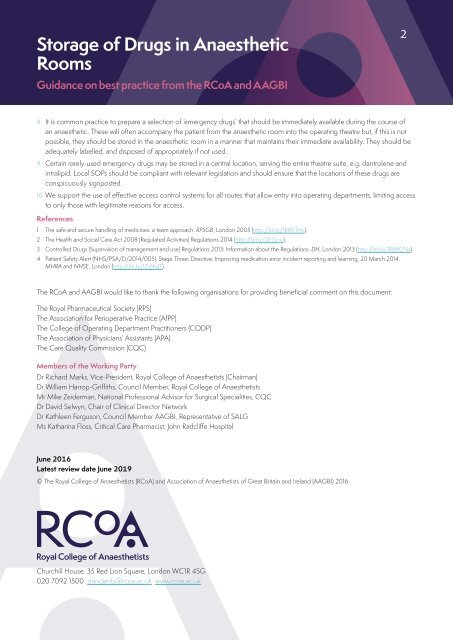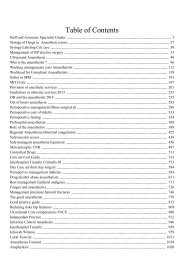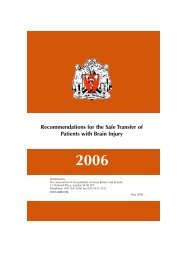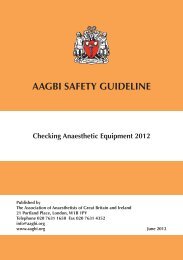TheatrePracticeStandardsGeneric1
You also want an ePaper? Increase the reach of your titles
YUMPU automatically turns print PDFs into web optimized ePapers that Google loves.
Storage of Drugs in Anaesthetic<br />
Rooms<br />
2<br />
Guidance on best practice from the RCoA and AAGBI<br />
8 It is common practice to prepare a selection of ‘emergency drugs’ that should be immediately available during the course of<br />
an anaesthetic. These will often accompany the patient from the anaesthetic room into the operating theatre but, if this is not<br />
possible, they should be stored in the anaesthetic room in a manner that maintains their immediate availability. They should be<br />
adequately labelled, and disposed of appropriately if not used.<br />
9 Certain rarely-used emergency drugs may be stored in a central location, serving the entire theatre suite, e.g. dantrolene and<br />
intralipid. Local SOPs should be compliant with relevant legislation and should ensure that the locations of these drugs are<br />
conspicuously signposted.<br />
10 We support the use of effective access control systems for all routes that allow entry into operating departments, limiting access<br />
to only those with legitimate reasons for access.<br />
References<br />
1 The safe and secure handling of medicines: a team approach. RPSGB, London 2005 (http://bit.ly/1R893Hc).<br />
2 The Health and Social Care Act 2008 (Regulated Activities) Regulations 2014 (http://bit.ly/1Zr5Lny).<br />
3 Controlled Drugs (Supervision of management and use) Regulations 2013: Information about the Regulations. DH, London 2013 (http://bit.ly/1R88CNa).<br />
4 Patient Safety Alert (NHS/PSA/D/2014/005). Stage Three: Directive: Improving medication error incident reporting and learning, 20 March 2014.<br />
MHRA and NHSE, London (http://bit.ly/1Zr6h4T).<br />
The RCoA and AAGBI would like to thank the following organisations for providing beneficial comment on this document:<br />
The Royal Pharmaceutical Society (RPS)<br />
The Association for Perioperative Practice (AfPP)<br />
The College of Operating Department Practitioners (CODP)<br />
The Association of Physicians’ Assistants (APA)<br />
The Care Quality Commission (CQC)<br />
Members of the Working Party<br />
Dr Richard Marks, Vice-President, Royal College of Anaesthetists (Chairman)<br />
Dr William Harrop-Griffiths, Council Member, Royal College of Anaesthetists<br />
Mr Mike Zeiderman, National Professional Advisor for Surgical Specialities, CQC<br />
Dr David Selwyn, Chair of Clinical Director Network<br />
Dr Kathleen Ferguson, Council Member AAGBI, Representative of SALG<br />
Ms Katharina Floss, Critical Care Pharmacist, John Radcliffe Hospital<br />
June 2016<br />
Latest review date June 2019<br />
© The Royal College of Anaesthetists (RCoA) and Association of Anaesthetists of Great Britain and Ireland (AAGBI) 2016<br />
Churchill House, 35 Red Lion Square, London WC1R 4SG<br />
020 7092 1500 standards@rcoa.ac.uk www.rcoa.ac.uk





